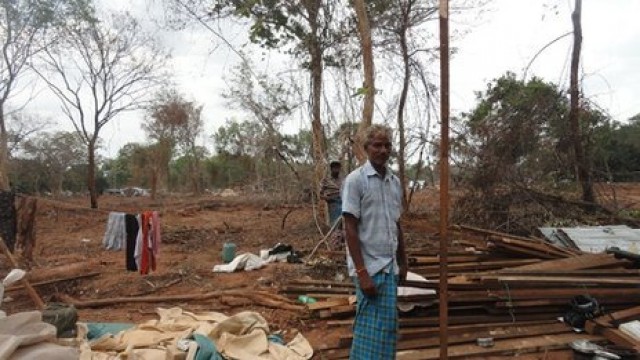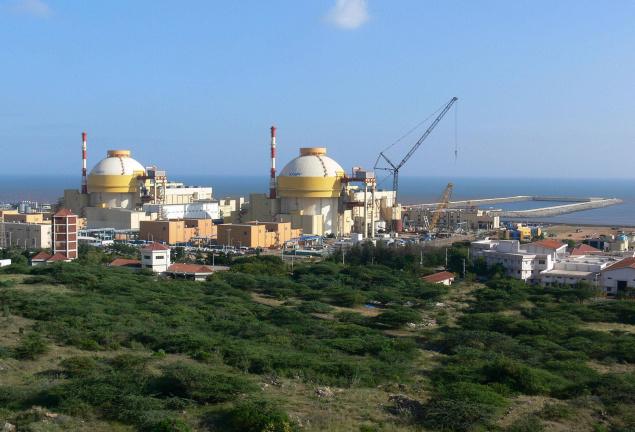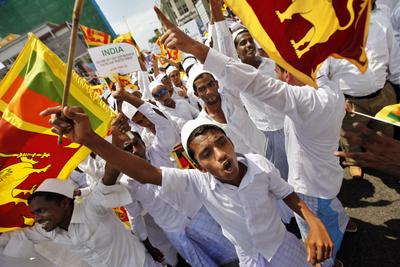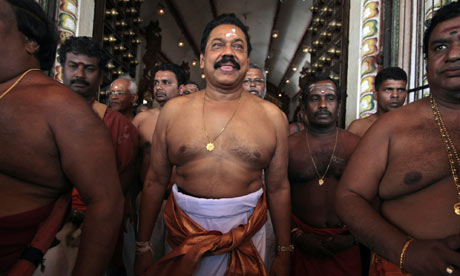 |
| Displaced Tamil families left in jungle. Photo: BBC |
Sunday, September 30, 2012
The Menik Farm Lie: ‘Who says we are resettled’ asks an IDP
Stunned at anti India sentiment: India to discuss Kudankulam nuclear power plant with Sri Lanka
 |
| Kundankulam Nuclear Power Plant |
Times of India
FUTA and the survival of democratic dissent; The suffocating grasp of an emergent dictatorship
Kumar David
"Where they burn books, they will afterwards burn people" - Heinrich Heine (German Poet 1821)
The madness fanned by Goebbels and fired by Nazi student organisations, reached a frenzied climax on the night of 10 May 1933 when the nation’s great libraries were stripped of radical, socialist, pacifist, culturally alien and Jewish books, and piled on bonfires, lit as Germany careened to censorship, culture control and eventually the most naked of all Twentieth Century dictatorships. No nation that permits the state to crush its knowledge workers can long survive. The FUTA strike is no longer about academic salaries, long ago it morphed beyond that, it is no longer about securing a fair deal in education for the nation’s children, that Rubicon has also been crossed.
"Where they burn books, they will afterwards burn people" - Heinrich Heine (German Poet 1821)
The madness fanned by Goebbels and fired by Nazi student organisations, reached a frenzied climax on the night of 10 May 1933 when the nation’s great libraries were stripped of radical, socialist, pacifist, culturally alien and Jewish books, and piled on bonfires, lit as Germany careened to censorship, culture control and eventually the most naked of all Twentieth Century dictatorships. No nation that permits the state to crush its knowledge workers can long survive. The FUTA strike is no longer about academic salaries, long ago it morphed beyond that, it is no longer about securing a fair deal in education for the nation’s children, that Rubicon has also been crossed.
Most Sri Lankans say judiciary is not independent: BT-RCB poll
A joint survey cum poll by the Business Times (BT) and the Colombo-based Research Consultancy Bureau (RCB) this week on concerns relating to the judiciary found an overwhelmingly number of respondents saying there is interference in the judiciary.
A similar number agreed that Sri Lankan judges are unable to discharge their duties and deliver judgments and orders without fear or favour. The poll, through email and street surveys in Nugegoda and Nawala, came on the back of a recent statement issued by the Judicial Services Commission
Saturday, September 29, 2012
The independence of the judiciary : Regressing into the Dark Ages
President Mahinda Rajapaksa’s indignant retort to newspaper editors this week that he did not attempt to interfere with the independence of Sri Lanka’s judiciary has all the hallmarks of the classic ‘swing and swerve’ tactics adopted by his administration. In other words, this refers to its now entrenched policy of swinging out at an individual or institution and then adroitly swerving sideways to avoid consequences while engaging in the most palpable if not absurd falsehoods to serve its purpose.
FUTA strike:Key questions about education, trade unionism, policy development and the future of students

Andi Schubert
The trade union action of the Federation of University Teachers’
Associations (FUTA) is now about to enter its fourth month. Prior to and
during the strike a number of debates and discussion have raged between
supporters, opponents and observers about the issues raised by FUTA
viz. education and the crisis facing the education sector in Sri Lanka.
In this short article I hope to examine the nature of the debate so far
and hope to broaden it by introducing the dimension of social
emancipation. This article is the further development of a point I
raised during the "Forum with Eran" program organized by Eran
Wickramaratne MP on the 26th of September which brought together Dr.
Nirmal Ranjith Dewasiri and Prof. Rajiva Wijesinha MP for a discussion
on the education crisis in Sri Lanka.
Judicial Service Commission secretary says danger to their security .
Judicial Service Commission (JSC) Secretary Manjula Tillekaratne said yesterday there was a danger to the security of all of them and their families beginning from the person holding the highest position in the judicial system.
“A situation has arisen where there is a danger to the security of all of us and our families beginning from the person holding the highest position in the judicial system,” Mr. Tillekaratne said.
“A situation has arisen where there is a danger to the security of all of us and our families beginning from the person holding the highest position in the judicial system,” Mr. Tillekaratne said.
Sri Lanka: Three things that can happen at 22nd session of HRC March 2013

Gibson Bateman, New York
SRI LANKA: Final batch of Menik Farm IDPs relocated
 |
| Many of the displaced were uninformed |
The last group of over 300 people from Menik Farm, once the world’s largest camp for internally displaced persons (IDPs), have been moved out, but not to their former villages.
“The world is being told an untruth about us being resettled,” Sivaguru Angaramuttu Udalayakumari, a 43-year-old IDP relocated from Menik Farm, told IRIN as she got on a bus, adding that she had little idea where she was going.
The group was not allowed to return to their homes in the Kepapilavu area of northeastern Sri Lanka's Mullaitivu District because their land was being occupied by the military,
Sri Lanka suicide rate one of the world’s highest
 |
| Niroshini Amarsinghe and her three children with photo of Milton Rupes Nonis |
New official data shows that Sri Lanka still has one of highest suicide rates in the world, with almost 4,000 people killing themselves per year, or about 11 per day. Dr. Neil Fernando, who heads the country’s National Institute of Mental Health Promotion, released the figures in a Suicide Prevention Day seminar on September 10. The majority of victims, he reported, were aged 15 to 44.
Friday, September 28, 2012
Human Rights Council: Action on Resolution on the Safety of Journalists
 |
| Austria introduce the resolution |
(Geneva) On 27th September during its 21st session the Human Rights Council unanimously passed a resolution on safety of the journalists. The resolution condemns in the strongest terms all attacks and violence against journalists and expresses its concerns on the growing threats to safety of journalists posed by non-State actors as well.
OHCHR web site says: Austria, introducing the draft resolution said that the resolution put the issue of safety of journalists squarely on the agenda of the Human Rights Council and there were three main elements.
Person on warrant at the President’s house
President Mahinda Rajapaksa met the editors of print and electronic media at Temple Trees on the 27th morning. Media Minister Keheliya Rambukwella, Higher Edcuation Minister S.B. Dissanayake and Presidential Advisor Lalith Weeratunge also participated in the meeting.
The demand of 6 per cent of the GDP for education is not political but social one
Laksiri Fernando
This refers to The Island editorial yesterday (26 September 2012) on basically the same title without the question: Who? It may be in order to caution the FUTA (the Federation of University Teachers’ Associations) of any possible deviation or adventure, given the subtle machinations that the government and more particularly the Minister in charge are hatching with the hope of crushing the legitimate demands of the academics which are the concerns of the general public at large on education and higher education.
This refers to The Island editorial yesterday (26 September 2012) on basically the same title without the question: Who? It may be in order to caution the FUTA (the Federation of University Teachers’ Associations) of any possible deviation or adventure, given the subtle machinations that the government and more particularly the Minister in charge are hatching with the hope of crushing the legitimate demands of the academics which are the concerns of the general public at large on education and higher education.
50% students fail GCE O/L Due to lack of funds for education
The United National Party (UNP) yesterday alleged that nearly 50% of the students who sit the GCE O/L Examination fail due to the government’s failure to allocate sufficient funds for education.
Addressing the media in Colombo yesterday, UNP parliamentarian Rosy Senanayake said students are unable to perform well in the exams as they have not been provided enough facilities such as trained teachers and laboratory facilities.
Addressing the media in Colombo yesterday, UNP parliamentarian Rosy Senanayake said students are unable to perform well in the exams as they have not been provided enough facilities such as trained teachers and laboratory facilities.
India accepted only 56 out of 169 recommendations of the UN Universal Periodic Review 2012
India has refused to accept most far reaching recommendations proposed by Human Rights Council members to India under the second circle of UPR. The accepted recommendations are mainly related to social, cultural and economic issues. Recommendations related to civil and political rights have been left without any positive response.
Some of the important recommendations that were not accepted by India are listed below:
Thursday, September 27, 2012
If Sri Lanka has any friends left in the democratic world, it is time now for them to respond
The academics are marching. The students are marching. The Muslims are marching.
Dharisha Bastians
The academics are marching. The students are marching. The Muslims are marching.
Every day hundreds images of throngs of people shouting slogans and demonstrating blare across television screens, newspapers and of course, the internet.
SMS news alerts about road closures and barricades abound as popular discontent rises to the surface through trade union agitation and ethno-religious outrage. In fact, with the opposition largely impotent, public discontent is being channelled into people’s movements that are taking arms against unpopular Government policy and rampant corruption.
Diaspora Muslim academic reasons out SLMC politics
 |
| Dr. ARM Imtiyaz |
Wednesday, September 26, 2012
News in Brief
Magistrate refuses to ban IUSF march, protest;
“The pen and papers are in our hands withdraw the complaint!” Another action caused by Thambuththegama Police officers;
Govt-JSC clash to intensify, President meets key ministers, advisors Urged to take stern action against JSC;
Politician’s gang murdered all six women in Kahawatte;
Galle docs strike today over Mayor’s conduct;
“The pen and papers are in our hands withdraw the complaint!” Another action caused by Thambuththegama Police officers;
Govt-JSC clash to intensify, President meets key ministers, advisors Urged to take stern action against JSC;
Politician’s gang murdered all six women in Kahawatte;
Galle docs strike today over Mayor’s conduct;
The government, the LLRC and what civil society can do
 |
| Mahinda Rajapaksa at a Hindu religious ceremony. (File photo) |
Dr. Jehan Perera
“The entire section of the LLRC Report that deals with the issue of missing and disappeared persons and the trauma it has wreaked on the lives of possibly tens of thousands of families has been entirely ignored by the LLRC Action Plan. As many as nine LLRC recommendations that are in paragraphs 9.43 to 9.60 are missing from the LLRC Action Plan.”An entrenched government
The government has overcome several formidable challenges to itself in the past few weeks. It
has now secured control over the Eastern Provincial Council even though it failed to win the majority of seats in it.
“The executive and legislature exist thanks to the judiciary” - Wijedasa Rajapaksha, President ,Bar association
.jpg) Q: What is the exact reason behind the resolution passed by the BASL?
Q: What is the exact reason behind the resolution passed by the BASL?There were two incidents; one is that the Secretary to the Judicial Services Commission issued a press release stating that the executive has interfered or tried to influence the JSC and its members. In the affairs of the Judicial Services Commission and in response to that when we had the monthly meeting of the Bar Council which is represented by all the Bar associations from the entire country, the members were of the unanimous view that we should condemn this sort of attempt to interfere with the JSC. We further decided that we would make a representation to the JSC to discuss ensuing issues with regard to the matter.
Thileepan’s Fast Touched the Spirit of the Tamil Nation and Mobilised Masses in Unprecedented Solidarity

Adele Balasingham
Thileepan, the young Tiger leader of Jaffna, took the podium on the 14th September at the Nallur Kandasamy temple to commence his fast- unto-death as a protest against India’s failure to fulfill her pledges, and to mobilise the frustrated sentiments of the Tamils into a national mass upsurgence.
Thileepan’s non-violent struggle was unique and extraordinary for its commitment. Although an armed guerrilla fighter, he chose the spiritual mode of ‘ahimsa’ as enunciated by the great Indian leader Mahatma Gandhi to impress upon India the plight and predicament of the people of Tamil Eelam.
The levels to which the Tamil people or more specifically, the LTTE cadres, are prepared to go for their freedom mirrors not only a deep passion for their liberation, but indicates the phenomenal degree of oppression they have been subjected to. It is only those who experience intolerable oppression of such a magnitude, of being threatened with extinction, that are capable of supreme forms of self sacrifice as we have seen from Thileepan’s episode.
Abolish the thirteenth amendment /Provincial councials
 |
| Silva: A leading Sinhala nationalist ideologue |
Divineguma bill should have opened the eyes of not only the government MPs but also of the others. The Supreme Court has decided that the Provincial Councils should approve the Bill before it is presented to Parliament. Some may argue that power would be concentrated in the hands of one individual if the bill becomes law. However, if there had been no Thirteenth Amendment, the Bill would not have been inconsistent with the Constitution.
The Divineguma Bill, even if it seeks to vest a single individual with more powers, it is not an arbitrary person who would use the powers but a cabinet minister under whose purview the particular Department or the Ministry would have been established.
US Lawmakers write to Secretary Clinton urging continued engagement with Sri Lanka on UNHRC resolution
Full Text of Letter, Signed by 31 US Legislators:
The Honorable Hillary Rodham Clinton
Secretary of State
U.S. Department of State
Washington, DC 20520
Dear Madam Secretary:
September 21, 2012
We write to express our concerns regarding reconciliation and accountability progress in Sri Lanka following its 26-year civil war and the alleged commitment of war crimes and crimes against humanity by both sides in the final stages of the conflict in 2009.
Sri Lanka: Action Plan, But No Action - ICG
 |
| No independent investigations into alleged war crimes |
The International Crisis
Group/20 September 2012
1. Overview
In the six months since the
Human Rights Council’s March 2012 resolution on “Promoting Reconciliation and
Accountability in Sri Lanka”,
the government of Sri Lanka
has taken no meaningful steps to implement the resolution’s core requirements
or otherwise address the country’s culture of impunity and deepening crisis of
the rule of law. The publication of a “national action plan” to
implement the recommendations of the Lessons Learnt and Reconciliation
Commission (LLRC) does nothing the change this: the government continues to
resist launching any independent investigations into alleged war crimes or
other serious human rights violations and has done nothing to establish
independent institutions able to hold accountable state agencies, the military,
or president Rajapaksa and his family.
Tuesday, September 25, 2012
Large crowds for university teachers’ ‘March’
It is reported that the protest march launched by university teachers commenced from Galle today (24th) morning and reached Ambalangoda in the evening.
IDP camp dismantled, inmates appeal directly to International Community
The SL military on Sunday dismantled the Cheddiku’lam IDP camp to forcefully remove the inmates, without making any permanent arrangement for their resettlement or return to their original villages. The seriously affected group is the villagers of Keappaa-pulavu of Mullaiththeevu district, whose village is now grabbed by the occupying military. The Sinhala military is quick to announce on Sunday, “There will be no more IDPs in the country from today.” On Friday, the camp inmates, having lost all confidence in Colombo government, have directly appealed for International intervention to enable them to return to their homes.
Can Burma Leapfrog Sri Lanka?

Forbes
With the rapid-fire opening of Burma/Myanmar stemming from apparently real reforms under new President Thein Sein, an intriguing regional competition may develop. Across the Andaman Sea lies another economic laggard of recent decades, Sri Lanka. Will the Burmese leapfrog it?
To the degree the Burmese closed economy has been measurable, its output has lagged Sri Lanka’s by GDP adjusted for purchasing power parity. This, despite the fact that Burma’s population is considerably larger. The two countries share a sorry recent history of socialist and/or kleptocrat rulers who deprived their countrymen of what appeared to be prosperous times in the post-colonial independence that followed World War II. (Both were once huge rice exporters, for example.)
Sri Lanka’s internet freedom deteriorating as world govts grow increasingly repressive online
“Countries at Risk: As part of its analysis, Freedom House identified a number of important countries that are seen as particularly vulnerable to deterioration in the coming 12 months: Azerbaijan, Libya, Malaysia, Pakistan, Russia, Rwanda, and Sri Lanka” – Report
Washington DC: Brutal attacks against bloggers, politically motivated surveillance, proactive manipulation of web content, and restrictive laws regulating speech online are among the diverse threats to internet freedom emerging over the past two years, according to a new study released today by Freedom House.UN welcomes closing IDP camp but has concerns; IDPS unable to return to their homes
 |
| Menik Farm: One of the largest IDP camps in the world |
United Nations (UN) Humanitarian Coordinator in Sri Lanka, Subinay Nandy said that there were concerns over 346 people who are unable to return to their original homes.
“This is a milestone event towards ending a chapter of displacement in Sri Lanka some three years after the civil war which ended in May 2009. But there are still some people who are unable to return to their homes and a solution urgently needs to be found,” Nandy said in a statement today.
Colombo appoints Sinhala Chief Secretary, sidelines Tamils in EPC
Sri Lankan government has appointed a Sinhalese, Mr DMS Abeygunawardena as Chief Secretary of the predominantly Tamil-speaking Eastern Province. Not a single Tamil has been appointed as minister by Colombo. Apart from the Muslim Chief Minister, three Muslims and a Sinhalese have been appointed as ministers to the newly formed EPC. Paramilitary operative Sivanesathurai Chandrakanthan alias Pillaiyan is the sole member of the newly elected EPC from the Batticaloa district, but he declined to accept a ministerial portfolio. Instead he has been appointed by the SL President as his ‘advisor’ for the entire Eastern Province.
Monday, September 24, 2012
Highlights of the OHCHR report on Sri Lanka to the Universal Periodic Review
UPR Sri Lanka: Compilation
prepared by the Office of the High Commissioner for Human Rights
The present report is a
compilation of the information contained in the reports of treaty bodies and
special procedures, including observations and comments by the State concerned,
and of the Office of the High Commissioner for Human Rights (OHCHR), and in
other relevant official United Nations documents. It is presented in a
summarized manner due to word-limit constraints. The report has
been prepared taking into consideration the periodicity of the review and
developments during that period.
It is time for the Long March for Free Education.
futa
It is time for the Long March for Free Education.
The long march currently being organized follows a series of ground-breaking mega events organized by FUTA to socialize the concept of the need to increase allocations for education (6%!) and de-politicizing of the education secotor.
It is time for the Long March for Free Education.
The long march currently being organized follows a series of ground-breaking mega events organized by FUTA to socialize the concept of the need to increase allocations for education (6%!) and de-politicizing of the education secotor.
FMM Ex-Co member threatened with death
SLB news
The Free Media Movement of Sri Lanka has issued a press statement ( 20th Sep) condemning the death threats to one of its EX- CO member, journalist and web editor Mr. Janith Vipulaguna.
Mr. Vipulaguna is the editor of Sinhala language news website 'Lanka Citisan Puwath. Earlier Mr. Vipulaguna had worked as a producer at the Young Asia Television.
The web site has reported that financial accounts of a festival called Vijitha Mela organised by a popular school in Matara District has not been submitted.
This Govt has Adversely Affected all Sri Lankans by Severely Diminishing Their Quality of Life
 |
| Rally on Aug 23, 2012: pic courtesy of: VikalpaSL |
For many persons of Sri Lanka, survival is daily struggle. In Mullaitivu fishermen aren’t allowed to fish. In Kilinochchi, homemakers and housewives are displaced from their homes and houses; In Kanguveli farmers are denied access to their farms.
It is easy to recognize this coerced decay of livelihood. Because Government abuse is most conspicuous in these areas, we trace our communal dissatisfaction to pigeonholed problems in the North and East.
Post-War politics is then consigned to finding an answer to the ever-festering ‘Tamil problem’, masking the more subtle scents of decay emanating from the deepest foundations of the Sri Lankan polity and wafting over the entire Island.
Will the Sri Lanka Muslim Congress run into an Eastern storm?
 By Chackravarthy
By ChackravarthySLMC’s going with the government in the East is not a surprise. This order was written by the higher ups. Present day SLMC is a party where cadres and leaders think differently.
Swearing in ceremony – Sep 18, 2012
An open letter on behalf of the people of Keappapulavu, Mullaitivu
 |
| Life in Aananthapuram, a neighbouring place to Keappaapulavu |
SLMC harms interests of Tamil speaking people by joining UPFA in EPC: Sampanthan
| Eastern refugees ( file photo) |
Sri Lanka: President attempts to trample on the Judicial Service Commission and the independence of the judiciary
 |
| President Rajapaksa called on the JSC to meet him |
Sunday, September 23, 2012
Popular Movement of Legal Professionals Must Fight for Survival of the Judicial System Facing Crisis
 |
| Lawyers protest against white van abductions in the court premises-Feb 2012-pic: courtesy: VikalpaSL |
Dictators do not believe in half hearted measures. This is an essential lesson that Sri Lanka is now learning at a painful cost.
We were immeasurably too ignorant, too consumed by self interest or too stubborn to realize this until it was too late.
Dismal reality of the absence of law
This week, as President Mahinda Rajapaksa locks horns with the country’s Judicial Service Commission (JSC) over a few incredibly minimal demonstrations of judicial independence, these lessons assume great significance.
Supreme Court to hear SLMC’s rights petition re EPC election campaign
 |
| SSP Ranagala |
The Bench comprising Chief Justice Shirani Bandaranayake and Justices K. Sripavan and Eva Wanasundera fixed the hearing for March 25.
‘Judiciary under siege- lawyers up in arms; BASL condemns interference of JSC
 |
| Supereme court: Dark clouds over it |
Rajapakshe said around 400 out of around 600 members from all parts of the country attended yesterday’s meeting at the BASL headquarters. The resolutions will be released to the public on Monday after all the office bearers sign them.
SL military threatens IDP camp inmates to accept ‘alternative resettlement’
 |
| The occupying Sinhala military was deployed in large numbers to intimidate the demonstrators in Mullaiththeevu on Friday |
Justice in Sri Lanka is Where the Victim Begs Pardon from the Offender for Daring to Challenge the Offender!
 |
| Groucho Marx:‘Military Intelligence’ is a ‘contradiction in terms’. |
Groucho Marx an outstanding comedian for about four decades of the last Century described ‘Military Intelligence’ as a ‘contradiction in terms’.
Groucho’s perception can be appreciated. In his time the gentlemen in khaki were not considered to be blessed with much intelligence. And those with intelligence – ‘nerds’ as we call them now – did not want to get into khaki.
Times have changed. This is the age of the ‘Rana Viru’ and those in military intelligence are considered the ‘top of the pops’.
Saturday, September 22, 2012
The Truth obout the Independence of the Human Rights Commission of Sri Lanka
The Human Rights Commission Act, No. 21 of 1996, which is the legal framework for the national human rights institution and prescribes its functions and powers, has been discussed previously and found to be wanting.27 The HRCSL recognises that there are deficiencies to its enabling law that have impeded its effectiveness, particularly in enforcement of its orders, and it proposes to prepare and submit suitable amendments to lobby the government.
However, there was no progress on this in 2011, nor were there any initial public consultations with civil society organisations and other interested parties, specifically on this matter.
India confirms support for UNHRC on Lanka war crimes
 |
| LTTE leader in military custody who found cut to death later |
“Not only in Sri Lanka, if war crimes and human rights violations are reported in any part of the world, India will not remain a mute spectator and will strongly oppose it,” Narayanasamy said.
Defamatory attacks on judiciary by State media: Bar Assn. to take legal action against Hudson?
 |
| Hudson Samarasinghe: mud slinging director |
Following a proposal by attorney Upul Jayasuriya, the BASL has appointed a committee comprising four President’s Counsel in this regard, according to Ada Derana website.
The BASL says comments by the SLBC chief in a morning show regarding the recent attack on the Mannar Court Complex, had been defamatory to the Mannar Magistrate and his family members.
UNP: Key LRRC recommendations not implemented
 |
| No independent commissions appointed |
It was the Rajapaksa regime that had asked the UNHRC for time to implement the LLRC recommendations such as the re-establishment of independent public, police, elections, judicial service and bribery and corruption commissions, but over a year after the Commission had released its findings there had been no progress with regard to transparency and accountability, UNP MP Lakshman Kiriella said.
India wants Sri Lanka to accept TNA as interlocutor
 |
| Rajapaksha and Singh: who tells what ( File photo) |
During talks with Sri Lankan President Mahinda Rajapaksa on Thursday — the first in over two years — it is understood that Prime Minister Manmohan Singh reiterated that the sooner the Sri Lankan government finalises a road map with the TNA, the better it would be for all sides. India concedes that Colombo has engaged in serious dialogue with the TNA but feels that the time has come to convert it into a programme of action.
Clear move by the government to intimidate the judiciary
.jpg) |
| Govt showed dissatisfaction over Divineguma judgement ( file photo) |
The organization referring to the statement issued by the Judicial Service Commission (JSC) on 16thSeptember 2012, says that clearly indicates that there are various attempts to interfere with the affairs of the JSC.
The release says that after the recent determination made by the Supreme on ‘Divinaguma’ Bill, the political leadership of the government has expressed its dissatisfaction over the decisions made by the Supreme Court.
Condemn the arrest of IUSF convener – JVP
 |
| Sanjeewa Bandara |
The statement issued yesterday (20th) states, “Yesterday (18th), the convener of Inter University Students Federation the student Sanjeewa Bandara was arrested by the police. He was arrested while going back after participating in an agitation organized by the IUSF demanding the government to solve issues in the education sector including that of university teachers.
Sunday Leader Editor resigns
The Chief Editor of The Sunday Leader Frederica Jansz resigned from her post today following what inside sources said was a dispute with the management after she was instructed to back the government.
Meanwhile the Colombo Gazette has learned that Shakunthala Perera, a senior female journalist who was one time at the Daily Mirror newspaper, has been appointed as the new Editor of The Sunday Leader.
Most of the shares of the newspaper were recently purchased by businessman Asanga Seniviratne.
News then spread that the controversial newspaper will be forced to change its Editorial stance and be more pro-government.
Friday, September 21, 2012
SL forces attack, throw dirt at people demanding resettlement in Mullaiththeevu (Mullaitivu)
 |
| Mullaitivu: Military calls shots |
Subscribe to:
Posts (Atom)


















